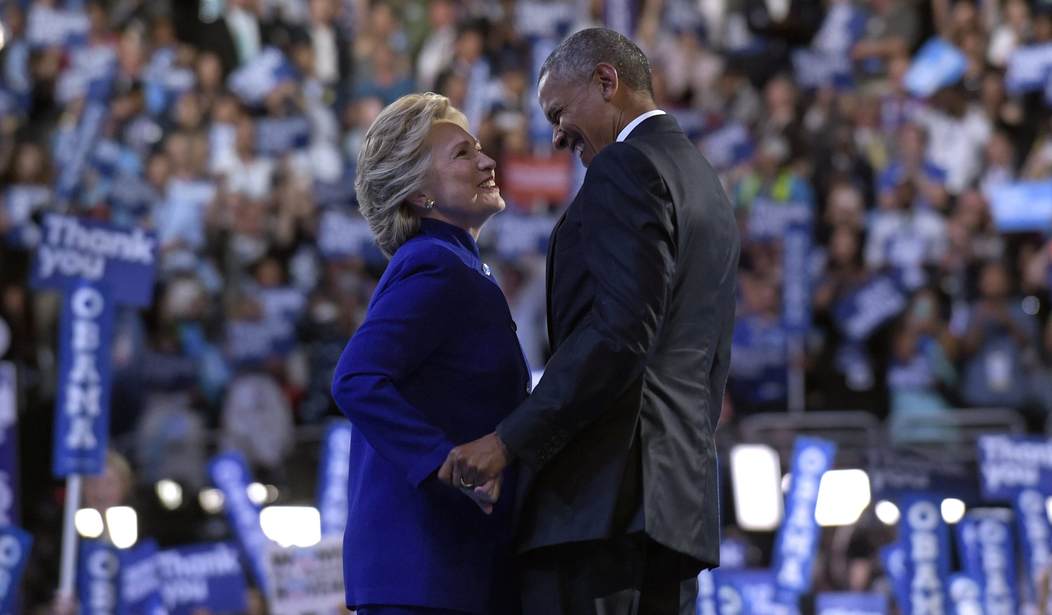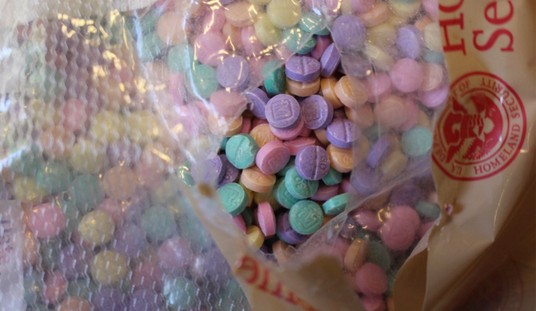President Obama’s speech at the Democratic National Convention on Wednesday night bore shades of a traditional Republican address, with themes of American exceptionalism and the power granted to the people by the Founders packaged with Reagan and Lincoln citations.
Reflecting on his first speech to the DNC in 2004, as a state senator, Obama insisted he’s “even more optimistic about the future of America than ever before.”
“We’re not done perfecting our union, or living up to our founding creed that all of us are created equal, all of us are free in the eyes of God,” he said. “And that work involves a big choice this November. I think it’s fair to say, this is not your typical election. It’s not just a choice between parties or policies, the usual debates between left and right. This is a more fundamental choice about who we are as a people, and whether we stay true to this great American experiment in self-government.”
“Look, we Democrats have always had plenty of differences with the Republican Party, and there’s nothing wrong with that. it’s precisely this contest of ideas that pushes our country forward. But what we heard in Cleveland last week wasn’t particularly Republican and it sure wasn’t conservative.”
Instead, Obama said, the RNC was “a deeply pessimistic vision of a country where we turn against each other and turn away from the rest of the world.”
“There were no serious solutions to pressing problems, just the fanning of resentment and blame and anger and hate. And that is not the America I know. The America I know is full of courage and optimism and ingenuity. The America I know is decent and generous. Sure, we have real anxieties about paying the bills and protecting our kids, caring for a sick parent. We get frustrated with political gridlock and worry about racial divisions. We are shocked and saddened by the madness of Orlando or Nice. There are pockets of America that never recovered from factory closures, men who took pride in hard work and providing for their families who now feel forgotten, parents who wonder whether their kids will have the same opportunities we had,” he said.
“All of that is real. We’re challenged to do better, to be better. But as I’ve traveled this country, through all 50 states, as I’ve rejoiced with you and mourned with you, what I have also seen, more than anything, is what is right with America.”
Obama’s pitch for Hillary Clinton painted her as more qualified for the Oval Office than he was.
And though the president doesn’t always name Donald Trump when he criticizes his proposals or soundbites, Obama mentioned the GOP nominee six times to the DNC crowd. “Does anyone really believe that a guy who’s spent his 70 years on this Earth showing no regard for working people is suddenly going to be your champion?” he asked.
Hillary, the president continued, would “destroy” ISIS without “resorting to torture or banning entire religions from entering our country.”
“Meanwhile, Donald Trump calls our military a disaster. Apparently, he doesn’t know the men and women who make up the strongest fighting force the world has ever known,” Obama said. “He suggests America is weak. He must not hear the billions of men and women and children, from the Baltics to Burma, who still look to America to be the light of freedom and dignity and human rights. He cozies up to Putin, praises Saddam Hussein, tells our NATO allies that stood by our side after 9/11 that they have to pay up if they want our protection.”
“…America is already great. America is already strong. And I promise you, our strength, our greatness does not depend on Donald Trump. In fact, it doesn’t depend on any one person. And that, in the end, may be the biggest difference in this election, the meaning of our democracy.”
Quoting Ronald Reagan’s description of America as a “shining city on a hill,” the president noted Trump “calls it ‘a divided crime scene’ that only he can fix.”
“He’s betting that if he scares enough people, he might score just enough votes to win this election. And that’s another bet that Donald Trump will lose,” Obama said. “And the reason he’ll lose it is because he’s selling the American people short. We are not a fragile people, we’re not a frightful people. Our power doesn’t come from some self-declared savior promising that he alone can restore order as long as we do things his way. We don’t look to be ruled.”
“Our power comes from those immortal declarations first put to paper right here in Philadelphia all those years ago,” Obama said. “We hold these truths to be self-evident, that all men are created equal, that we the people can form a more perfect union. That’s who we are. That’s our birthright, the capacity to shape our own destiny.”
America, he added, “has never been about what one person says he’ll do for us — it’s about what can be achieved by us, together, through the hard and slow and sometimes frustrating, but ultimately enduring work of self-government.”
He told a story about his grandparents to make the point that America doesn’t need to be made great again. “America has changed over the years. But these values that my grandparents taught me, they haven’t gone anywhere,” the president said. “They’re as strong as ever; still cherished by people of every party, every race, every faith. They live on in each of us. What makes us American, what makes us patriots is what’s in here. That’s what matters.”
“…That’s why anyone who threatens our values, whether fascists or communists or jihadists or homegrown demagogues, will always fail in the end.”
Hillary, who accepts the nomination in a speech tonight, walked out after Obama finished his address and gave him a big hug.
Former President Bill Clinton watched Obama’s speech flanked by two contenders who didn’t make the VP cut this time, Agriculture Secretary Tom Vilsack and Labor Secretary Tom Perez.
The Trump campaign issued a response from senior policy advisor Stephen Miller, a former aide to Sen. Jeff Sessions (R-Ala.), declaring it was “a sad night for the Democratic Party.”
“Never has a party been so disconnected from what is happening in our world,” Miller said. “Instead of dealing with reality, they spoke in cheap, petty terms beneath the dignity of a convention.”
Miller accused Dems of resorting to “the politics of fear, trying to convince Americans not to vote for change — they spoke on behalf of the big banks and the big elites, not on behalf of suffering Americans.”
“…The Democrats offered only more rewards for the rich, powerful and well-connected, and more angry, demeaning, sniping attacks against all decent Americans who want change for their families.”









Join the conversation as a VIP Member